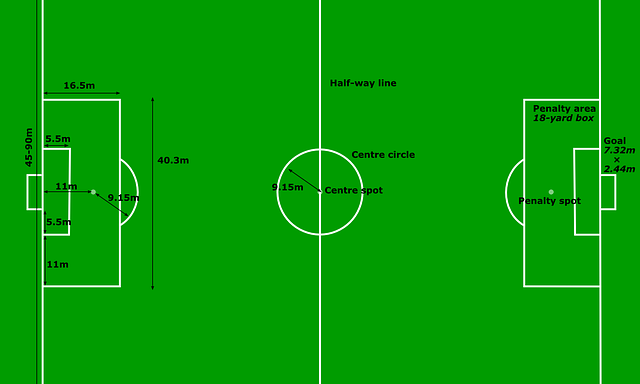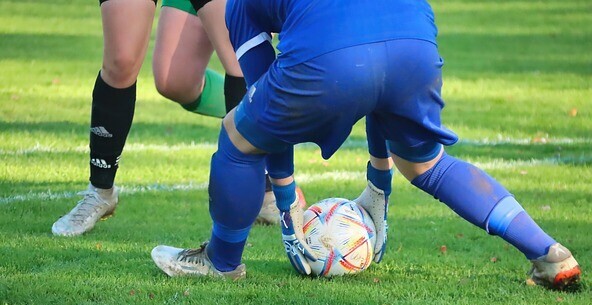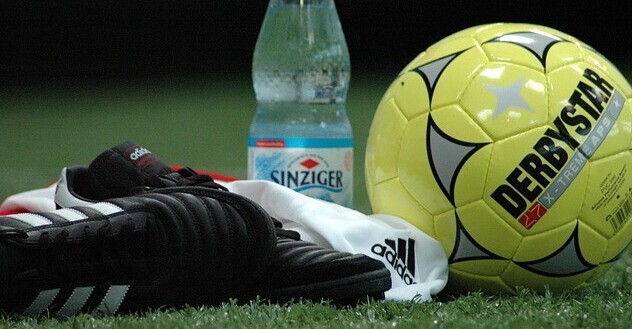 Soccer isn’t only played with your feet. It’s a demanding sport that challenges your mind as much as your body. Mental strength can be just as important as technical skill on the field. Many players find that using specific mental strategies helps them stay calm, focused, and resilient under pressure.
Soccer isn’t only played with your feet. It’s a demanding sport that challenges your mind as much as your body. Mental strength can be just as important as technical skill on the field. Many players find that using specific mental strategies helps them stay calm, focused, and resilient under pressure.
Whether you’re a budding athlete or an experienced competitor, building mental toughness is key to performing well. In this article, we’ll explore 10 soccer mental strategies that can help improve your game. These approaches work on the idea that a strong mind breeds better decision-making and improved overall performance on the pitch.
1. Visualization: Picture Success Before the Game

The act of visualization is about creating a mental image of desired outcomes. When you imagine scoring a goal or making a crucial pass, it becomes a training tool for your real-life actions.
Spend a few minutes before training or a match picturing key moments. Picture every detail, like the way the ball moves, the speed of your run, and how you celebrate your success. Strong mental images can help reinforce confidence and calm nerves under pressure.
How to Practice Visualization:
- Find a quiet spot where you can focus without interruptions.
- Close your eyes and imagine executing your best moves.
- Practice regularly until these images feel like second nature.
When visualization becomes part of your routine, you may notice a boost in your performance and a clearer focus during matches.
2. Goal Setting: Clear Objectives On and Off the Field

Setting specific and measurable goals helps you stay motivated both during practice and in matches. Goals are not only about winning games but also about personal growth and skill development.
This mental strategy involves breaking down your long-term objectives into smaller, manageable targets. For instance, if you want to improve your dribbling skills, focus on a few precise techniques until they feel natural.
Steps for Effective Goal Setting:
- Define clear short-term and long-term goals.
- Break these goals down into everyday achievements.
- Review your progress regularly to make adjustments.
Clear goals help maintain focus and provide a roadmap for sustained improvement throughout the season.
3. Mindfulness Meditation: Stay Present in the Moment

Mindfulness meditation is a strategy that encourages you to remain in the present moment. By focusing on your current thoughts and sensations, you can reduce anxiety and improve concentration on the field.
This practice trains your brain to redirect thoughts away from distractions, making it easier to get back on track when challenges arise during a match.
How to Get Started:
- Begin with short meditation sessions—just 5 to 10 minutes a day can make a difference.
- Focus on your breathing and let stray thoughts pass without judgment.
- Incorporate mindfulness before games to center your energy.
Regular mindfulness practice can transform your approach to stressful in-game moments, helping you stay calm even under intense pressure.
4. Positive Self-Talk: The Power of Encouragement

Every player hears an inner voice during moments of doubt. Positive self-talk means replacing those negative remarks with encouraging and constructive thoughts. This method fosters self-confidence and helps reduce anxiety when the game heats up.
Instead of getting bogged down by mistakes, remind yourself of past successes and reaffirm your ability to overcome challenges on the field.
Tips for Positive Self-Talk:
- Practice affirmations such as, “I can do this” or “I am prepared” during practice.
- Replace critical thoughts with kind and encouraging words.
- Revisit these affirmations regularly to build a lasting positive response.
Using positive self-talk can help you bounce back from setbacks quickly and maintain a sense of control during a game.
5. Resilience Training: Learn from Every Setback
Soccer is a game of highs and lows. Resilience training involves developing strategies to recover after mistakes or losses. The objective is to view setbacks as learning opportunities rather than definitive failures.
This mental approach relies on recognizing what went wrong and using that information to make adjustments or changes in tactics in the future.
Building Resilience Involves:
- Accepting that mistakes are part of the game.
- Reflecting on your performance to identify areas of improvement.
- Staying focused on solutions rather than dwelling on the problem.
By embracing resilience, you step up your ability to recover during difficult matches and continue playing your best even after setbacks.
6. Concentration Drills: Sharpen Your Focus Under Pressure

The ability to concentrate intensely during key moments is a critical part of any mental strategy. Concentration drills are exercises designed to improve your focus during training sessions and games.
These drills help you avoid distractions so that you can make better decisions on the pitch, even when the situation is chaotic.
Ways to Improve Concentration:
- Practice blocking out background noise during drills.
- Engage in exercises that require precise timing and coordination.
- Combine physical drills with cognitive challenges to push your focus limits.
Strong concentration skills can lead to better anticipation of play, smarter tactical decisions, and an overall improvement in your game performance.
7. Routine Building: Develop Pre-Game and In-Game Rituals

A reliable routine can stabilize your performance levels during both training and actual matches. Establishing a routine helps your brain and body get into a consistent rhythm, which can reduce anxiety and improve focus.
This strategy involves creating sets of actions or rituals you perform before and during a game, such as specific warm-up exercises or mental checks that keep you centered.
How to Create an Effective Routine:
- Outline a set of activities that prepare you mentally and physically.
- Incorporate light stretching, controlled breathing, and a mental recap of your strategy.
- Practice this routine regularly so it becomes a natural part of your game preparation.
A well-practiced routine not only calms your nerves but also signals to your mind that it’s time to perform at your best.
8. Stress Management: Keep Anxiety at Bay
Soccer, like many competitive sports, can be stressful. Managing stress effectively is a very important mental strategy to prevent feelings of overwhelming anxiety that can hinder your performance.
Through a combination of breathing techniques and progressive muscle relaxation, you can reduce tension and remain calm in high-pressure situations. Recognize when your stress levels are rising and implement these techniques to regain steady control.
Effective Stress Management Techniques:
- Practice deep-breathing exercises during time-outs or breaks.
- Engage in light stretching to relieve muscle tension.
- Focus on the task at hand rather than potential long-term consequences.
Managing stress not only boosts your in-game performance but also aids in better recovery during off-field hours.
9. Tactical Awareness: Quick Decision-Making on the Field
Tactical awareness is about understanding the game’s flow and making quick decisions based on what’s happening around you. This mental strategy improves your ability to anticipate opponents, pass accurately, and create scoring opportunities.
Developing tactical awareness involves studying the game, recognizing patterns, and being ready to adjust your strategy instantly during gameplay.
Improving Tactical Awareness:
- Watch game footage to learn from the pros.
- Engage in team drills that simulate different game scenarios.
- Discuss tactics with your coach and teammates to gain diverse perspectives.
Honest awareness of the game helps you make smarter moves and react faster. This focused approach makes you a more effective player on the pitch.
10. Reflection and Review: Analyze Your Performance
Taking time to reflect on your performance helps pinpoint what worked and what didn’t during a match. Reflection and review encourage a mindset of continuous improvement. Instead of simply moving on after a game, take time to think on your decisions, positioning, and mental state throughout the match.
This strategy means you consciously learn from both successes and mistakes. By reviewing your performance, you can adjust training practices and game plans accordingly.
Steps for Effective Reflection:
- After each game, identify key moments that impacted your performance.
- Record your thoughts and feelings about these moments in a journal.
- Set new mini-goals based on the lessons learned from each game.
Making reflection part of your regular routine might be the most rewarding mental strategy, as it helps you evolve as both a player and a person over time.
Final Thoughts
Soccer is a game that challenges every aspect of your being, especially your mind. By embracing these 10 mental strategies, you can build the critical skills needed to handle pressure, bounce back from setbacks, and ultimately perform better on the pitch. Using visualization, setting clear goals, practicing mindfulness, and fostering positive self-talk, among other techniques, adds a deeper layer to your training regimen.
Every strategy outlined here is designed to be both practical and repeatable. Whether you find it helpful to incorporate all of them or choose a few tailored to your specific needs, each approach offers a way to strengthen your game mentally. The better you become at managing your thoughts and emotions, the more consistent your performance will be when the stakes are high. Remember that much like physical training, mental conditioning requires time and effort to become second nature.
Building mental toughness doesn’t require grand gestures. Small, consistent changes in how you approach challenges can lead to noticeable improvements. These strategies might just be the support system you need to transform your approach to the game. They help you remain calm when pressure mounts, make decisive plays on the fly, and, most importantly, enjoy every minute on the field. Which of these mental strategies will you start with? Each one provides a unique way to boost performance and resilience. Try out one or blend several into your routine to see what perfectly fits your style of play. Over time, these methods will become a natural part of your game, giving you an edge that goes well beyond physical training.
11. Extra Mental Exercises: Extra Tools for Peak Performance
In addition to the core strategies discussed above, there are extra mental exercises you can incorporate into your routine to further sharpen your cognitive skills. These exercises include a mix of breathing practices, quick-reaction games, and cognitive puzzles that are designed to keep your mind engaged both on and off the field. By dedicating a few minutes each day to these additional drills, you can work on areas like pattern recognition and rapid decision-making.
For instance, you might start your day with deep-breathing exercises that help center your thoughts and set a positive tone. After a training session, spend a few extra minutes reviewing key plays with mental puzzles that challenge you to recall critical movements or tactics. These exercises can be as simple as trying to remember a sequence of actions or as involved as setting up mini-challenges with your teammates.
Furthermore, try incorporating visualization techniques with a twist: combine them with mental arithmetic or memory games to expand your cognitive load. This dual-task approach not only reinforces your focus but also simulates the pressure of a live game where you need to multitask efficiently. Over time, these extra exercises can boost your overall mental agility and confidence, ensuring that you are well-prepared to handle any challenges on the pitch.
Embracing both the foundational strategies and these additional mental exercises can create a super detailed approach to your mental game. This comprehensive method not only prepares you for the physical challenges of soccer but also conditions your mind to be flexible, resilient, and always ready to make those split-second decisions in the heat of competition.

Mental strategies in soccer are often underestimated, yet they play a crucial role in performance, especially under pressure. I’ve seen players with great technical skills struggle simply because they lack mental discipline or focus. Building habits like visualization, emotional control, and consistent pre-game routines can really elevate a player’s game. What stands out is how these techniques aren’t just for elite athletes. Anyone can apply them with practice. Mental strength truly bridges the gap between talent and results on the field.
yes ,it is true Slavisa